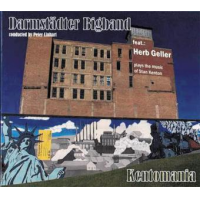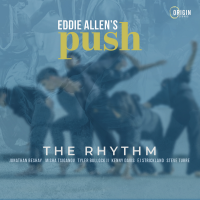Home » Jazz Articles » Big Band Caravan » Darmstadter Big Band / Alon Yavnai–NDR Big Band / Red Ba...
Darmstadter Big Band / Alon Yavnai–NDR Big Band / Red Bank Jazz Orchestra
 Dartstadter Big Band
Dartstadter Big BandKentomania
Self Published
2010
Of all the recorded tributes to the legendary Stan Kenton released during the centennial of his birth (2011), the Darmstadter Big Band's Kentomania (it's spelled that way on the jacket cover and disc) is unequaled for one reason alone: it has former Kenton standout Herb Geller as a soloist, the others do not. Geller, now in his eighty-third year, is as sly as a fox and spry as a gazelle on Bill Holman's emphatic arrangements of "Indiana" and "I Remember You" and Bill Mathieu's beguiling take on John Lewis' "Django." While that alone should be worth the price of admission, there are other reasons to consider Kentomania, not the least of which is that conductor Peter Linhart has assembled a world-class ensemble that readily absorbs the Kenton library and brings it vividly to life.
The album opens on a high note with Kenton's timeless theme, "Artistry in Rhythm," which segues immediately into Gerry Mulligan's even-tempered dance-floor arrangement of the Rodgers and Hart standard "Where or When." "Indiana" is followed by Hank Levy's seductive "Decoupage," Holman's fast-paced "Works" and his fiery arrangement of Enresto Lecuona's "Malaguena," "Django" by Bob Curnow's rock-inflected arrangement of "Live and Let Die" and Johnny Richards' temperate reading of Victor Young / Ned Washington's "Stella by Starlight." After Geller shines on "I Remember You," the band wraps things up neatly with Mark Taylor's prancing "Granada Smoothie" and a brace of splendid charts by Dave Barduhn: Stephen Sondheim's "Send in the Clowns" and the Hanna / Barbera cartoon classic, "Meet the Flintstones." Tenor saxophonist Linhart is the featured soloist on "Stella by Starlight" and "Flintstones," alto Dieter Bock on "Decoupage" and "Malaguena," guitarist Axel Muller-Schroth on "Live and Let Die," trumpeter Ralf Noske on "Granada Smoothie," pianist Steffen Stutz on "Send in the Clowns." None of them disappoints, nor does the ensemble as a whole.
If nothing else, Kentomania explicitly affirms that European jazz ensembles are advancing ever closer to their American counterparts when it comes to assimilating and unraveling music that once was looked upon as inherent in our nature and thus beyond the reach of others. It helps, of course, to have Herb Geller in the lineup, but even without his presence this would remain an exemplary synopsis of the transcendent music of Stan Kenton.
 Alon Yavnai / NDR Big Band
Alon Yavnai / NDR Big BandShir Ahava
Alon Yavnai Music
2012
Alon Yavnai, an Israeli who began playing the piano at age four, says little about himself in the sleeve notes to Shir Ahava, his splendid large-scale recording debut with Germany's outstanding NDR Big Band. A quick glance online, however, reveals that he studied at Boston's Berklee School of Music, earned first-place honors in the Great American Jazz Piano Competition, has played and recorded with the great Cuban multi-instrumentalist Paquito D'Rivera (with whom he won a Grammy Award for Best Latin Jazz Album), and has performed with such well-known musicians as Freddie Hubbard, Regina Carter, Joe Lovano, Nancy Wilson, Louis Hayes, Ravi Coltrane, Claudio Roditi, Rufus Reid and George Garzone, among others.
Yavnai first became acquainted with the NDR Big Band while touring as a member of D'Rivera's rhythm section, wrote a couple of charts for the band, then approached producer Axel Durr to suggest that they collaborate on a full-blown big-band enterprise. Durr was receptive, so Yavnai returned to New York and started writing. The result is Shir Ahava ("Love Poem"), which enwraps seven of Yavnai's lively and colorful compositions / arrangements. Besides writing everything, Yavnai is listed as pianist but the keyboard he's playing on "Travel Notes" sounds early on more like a Persian santour than a conventional piano. Soprano Lutz Buchner and trumpeter Ingolf Burkhardt also solo on "Travel Notes," one of three numbers that run for more than ten minutes (the others are "Au Castagney" and "Ilha b'nit"). The NDR receives a vigorous workout on every track and welcomes the challenge of helping Yavnai's music come alive.
It's clear from the outset that rhythm is at the heart of everything Yavnai writes, and there's more than a dash of Middle Eastern flavor seasoning "Bitter Roots," "Zriha" and "Ilha b'nit," each of which is a rhythmic and harmonic pleasure. When Yavnai changes pace, as he does on "Au Castagney" and "Sof" (each tastefully introduced by his unaccompanied piano), the outcome is no less rewarding. Yavnai's graceful piano also launches "Shir Ahava," a contemporary rhapsody whose Middle Eastern provenance is less conspicuous. The handsome solos are by Yavnai, Burkhardt, Buchner (tenor) and flutist Fiete Felsch. Trombonist Dan Gottshall is showcased on "Zriha," while Felsch, trumpeter Reiner Winterschladen and guitarist Sandra Hempel have their say on "Au Castagney," Felsch and baritone Frank Delle on "Bitter Roots," Yavnai, Felsch and Buchner (clarinet) on "Ilha b'nit" (whose closing shout chorus resonantly prefaces the tranquil "Sof").
Alon Yavnai is an exemplary pianist, composer and arranger, the NDR Big Band a world-class ensemble, and together they have produced an uncommonly invigorating and impressive album, one that should please any partisan of superlative big-band jazz.
 Red Bank Jazz Orchestra
Red Bank Jazz OrchestraStrike Up the Band!
Hip City Jazz
2012
Red Bank, NJ, is best known as the birthplace of "the Kid from Red Bank," a.k.a. the legendary William "Count" Basie, one of the most influential bandleaders of the Swing Era and beyond. The city is now home to the Red Bank Jazz Orchestra, which upholds the Basie tradition in grand style on its debut recording, Strike Up the Band! It helps, of course, to have an artistic director as renowned as Joe Muccioli, who was able in 2006 to assemble an A-list of first-call musicians from the greater New York City area to form the RBJO. Besides being top-tier sidemen, these gentlemen know their Basie, and it shows. They even form a charming vocal "chorus" on the timeworn "Baby Won't You Please Come Home," nimbly adding counterpoint to James Chirillo's rhythmic banjo.
Naturally, Basie / Neal Hefti's "The Kid from Red Bank" is on the enticing menu, along with the Count's iconic theme, "One O'Clock Jump," and songs from the libraries of the Duke Ellington, Quincy Jones, Tommy Dorsey and Thad Jones / Mel Lewis orchestras. Ellington is represented by "Such Sweet Thunder" and "The Mooche," Quincy Jones by "Moanin,'" Dorsey by "I'll Never Smile Again" (featuring Wayne Goodman's muted trombone), Jones / Lewis by Thad's brassy anthem, "Us." The RBJO employs a trio of guest vocalists including Joe Piscopo, best known as a comedian, who sits in for the incomparable Frank Sinatra on one of Old Blue Eyes' swinging hits, "Come Fly with Me." Piscopo actually sings better than might be expected; on the other hand, there was only one Frank Sinatra, and Piscopo flies well below Frank's rarefied cruising range. Champian Fulton (that's a she) is bright and engaging on Benny Carter's blistering arrangement of "After You've Gone," Tony DeSare the same on Frank Loesser's "I Believe in You."
The lively opener, "Strike Up the Band," also from the Basie book, encompasses the first of three clear-headed solos by tenor saxophonist Dan Block. Trumpeter Shawn Edmonds is showcased on "Such Sweet Thunder," alto Andy Farber on a Basie-like reading of "Baby Won't You Please Come Home," soprano Bruce Williams on Charlie Chaplin's "Smile," pianist Steve Meashey on "The Kid from Red Bank." Block, Goodman and trumpeter Brian Pareschi share solo honors on "The Mooche," Pareschi, Ashe and Williams on "Moanin,'" Pareschi, trumpeter Irv Grossman and trombonist Dion Tucker on "One O'Clock Jump."
: Thanks to the RBJO, the big-band flame lit so many years ago by Basie continues to burn brightly in the maestro's hometown. Muccioli has chosen wisely his musicians and material, giving rise to a bracing studio session that embodies more than a touch of Basie in its high-spirited approach to traditional big-band jazz.
 Landes Jugend Jazz Orchester Bayern
Landes Jugend Jazz Orchester BayernWie Heisst der Typ?
Self Published
2012
Germany not only boasts a number of splendid college-level jazz ensembles, it also has youth orchestras, the best-known of which is the Bundesjazzorchester, or BuJazzO. Groups such as Landes Jugend Bayern are a step or two removed from BuJazzO; for the sake of comparison, think of the University of North Texas' flagship ensembles, the One O'Clock or Two O'Clock Lab Bands. Landes Jugend is basically at that level, which is more or less as proficient as young jazz orchestras can be. Some of the musicians in the various Landes Jugend ensembles will eventually audition for and perhaps be accepted as members of BuJazzO, whose upper age limit is twenty-five. Baritone saxophonist Florian Leuschner and trombonist Lukas Jochner, who appear on this recording from 2010, already are members of BuJazzO, while Martin Seiler, who is featured on his own composition "I Wish You All the Luck in the World," is as gifted as any young tenor saxophonist in Germany or anywhere else.
Seiler also wrote the swift and colorful "Dimwit," on which he solos with soprano saxophonist Daniel Klingl and vibraphonist Felix Prihoda, and "Abscheid," a virile anthem that encompasses astute solos by tenor Sebastian Wehle and drummer Silvan Strauss. Leuschner solos ardently with flugel Johannes Stange and pianist Tom Berkmann on Thad Jones' "Three and One," and is out front by himself on another theme by Jones, "Us." There are four vocals by Lydia Schiller (who has since teamed with bandmates Leuschner and pianist Sevi Krieger to form the trio Lucid). "Waldemar" is sung in German, "Quen" in an inscrutable tongue, Van Morrison's "Moondance" and the Billy Preston ballad "You Are So Beautiful" in English. Leuschner appends a feral contra-bass clarinet solo on "Quen," while Jochner, Wehle and pianist Stephan Plecher dig in their spurs on the irrepressible "Waldemar" (on which Schiller seems most at ease).
There is one conspicuous departure from the straight and narrow, on Klingl's innovative "Modalitat," but even here the anomaly is short-lived (well under two minutes), as Jochner and flugel Andreas Schnell deliver plain-spoken solos while the ensemble settles into a more compliant groove. The ensemble is exemplary, the soloists enlivened from start to finish. In other words, an impressive performance by one of Germany's outstanding young jazz orchestras.
 Eastern Illinois University Jazz Ensemble
Eastern Illinois University Jazz EnsembleThree O'Clock Downbeat
Self Published
2012
While perhaps not as well known as some of its contemporaries, the Eastern Illinois University Jazz Ensemble has earned its share of honors and awards, from DownBeat magazine and at various intercollegiate jazz festivals. As Three O'Clock Downbeat, recorded in 2008-09, clearly shows, the accolades have not been misdirected. Sam Fagaly's intrepid ensemble swings hard, plays superbly as a unit, and betrays no uneasiness when asked to come to grips with formidable charts by the likes of Bill Holman, Thad Jones, Kim Richmond, Mark Taylor and others.
Eight of the album's eleven numbers, which, Fagaly writes, "represent the broad range of big band jazz performed by the EIU Jazz Ensemble," were set down in a studio, the rest in concert. Trombonist Allan Horney, the university's former director of Jazz Studies, is featured on one of the concert themes, Jones' evocative arrangement of the Gus Kahn / Walter Donaldson standard "Makin' Whoopee." Dave Holland's "The Balance" (arranged by Randall Reyman) and Lars Halle's "Sole Stains" were also taped live. Soprano Joshua Marcus and pianist Olivier David solo on "Balance," David, Marcus, trumpeter Garrett Schmidt and drummer Joe Burress on "Stains."
The ensemble comes out swinging on Richmond's assertive "Big Mama Louise" (enterprising solos by trumpeter Nick Grill and tenor Tony Wong) and has fun with Holman's clever arrangement of Billy Strayhorn's well-traveled "Take the 'A' Train." Marcus (alto) is showcased on Duke Ellington's plaintive "Star-Crossed Lovers," which precedes Wayne Shorter's "Nefertiti," Dave Brubeck's "In Your Own Sweet Way," "Sole Stains" and "Makin' Whoopee." The ensemble wraps things up with Taylor's robust treatment of Bronislau Kaper's "Invitation," John Coltrane's "Naima" (wonderfully scored by Marcus, especially for the sax section) and a second Holman chart, his contemporary take on W.C. Handy's venerable "St. Louis Blues." Grill and Marcus solo on "Invitation" and "Naima," Schmidt and David on "Blues."
If there's a downside it lies in the recorded sound, which varies from track to track and doesn't always give the group its due. Strange as it may seem, the numbers recorded in concert are in some respects equal to or better than those recorded in the studio. Aside from that small and easily overlooked blemish, there's really nothing to censure, as the choice of material is splendid and the EIU ensemble rises above every challenge with ease. Well done, scholars.
Tracks and Personnel
Kentomania
Tracks: Artistry in Rhythm; Where or When; Indiana; Decoupage; Works; Malaguena; Django; Live and Let Die; Stella by Starlight; I Remember You; Granada Smoothie; Send in the Clowns; Meet the Flintstones.
Personnel: Peter Linhart: conductor, tenor sax, flute; Ralf Noske: trumpet, flugelhorn; Nils Wallstadt: trumpet, flugelhorn; Alexander Schadt: trumpet, flugelhorn; Nikolai Schedy: trumpet, flugelhorn; Harald Maier: trumpet, flugelhorn; Dieter Bock: alto sax, flute; Alex Jung: alto, tenor sax, flute; Bjorn Grun: tenor, baritone sax, flute; Bodo Christmann: baritone sax, flute; Sven Adelberger: trombone; Peter Hergert: trombone; Dennis Ohletz: trombone; Jorg Stahlmann: bass trombone; Chris Perschke: bass trombone; Steffen Stutz: piano; Axel Muller-Schroth: guitar; Udo Brenner: bass; Jens Biehl: drums. Special guest artist—Herb Geller: alto sax.
Shir Ahava
Tracks: Shir Ahava; Travel Notes; Au Castagney; Bitter Roots; Zriha; Ilha b'nit; Sof.
Personnel: Alon Yavnai: composer, arranger, piano; Thorsten Benkenstein: trumpet; Ingolf Burkhardt: trumpet; Michael Leuschner: trumpet; Reiner Winterschladen: trumpet; Fiete Felsch: alto sax, flute, alto flute; Peter Bolte: alto sax, flute; Lutz Buchner: tenor, soprano sax, clarinet; Christoph Lauer: tenor sax; Frank Delle: baritone sax; Dan Gottshall: trombone; Klaus Heidenreich: trombone; Stefan Lottermann: trombone; Ingo Lahme: bass trombone; Sandra Hempel: guitar; Ingmar Heller: bass; Ziv Ravitz: drums; Marcio Doctor: percussion.
Strike Up the Band!
Tracks: Strike Up the Band; Such Sweet Thunder; The Mooche; After You've Gone; Moanin'; Baby Won't You Please Come Home; Smile; I Believe in You; The Kid from Red Bank; Us; I'll Never Smile Again; Come Fly with Me; One O'Clock Jump.
Personnel: Joe Muccioli: conductor; Bob Millikan: trumpet; Brian Pareschi: trumpet; Shawn Edmonds: trumpet; Irv Grossman: trumpet; Dave Trigg: trumpet (1, 2, 12); Joe Scannella: trumpet (1, 2, 12); Andy Farber: alto sax, flute, clarinet; Bruce Williams: alto, soprano sax, alto flute, clarinet; Dan Block: tenor sax, flute, clarinet; Marc Phaneuf: tenor sax, flute, clarinet; Kurt Bachur: batitone sax, flute, clarinet, English horn; Wayne Goodman: trombone; Dion Tucker: trombone; Bruce Eidem: trombone; Jack Schatz: trombone; Steve Ashe: piano; James Chirillo: guitar, banjo (3, 4); Tony Micelli: vibraphone (8, 12); Bill Moring: bass; Mike Nigro: drums (1, 2, 7, 12); Steve Johns: drums (3-6, 8-11, 13). Special guests—Champian Fulton: vocal (4); Tony DeSare: vocal (8); Joe Piscopo: vocal (12).
Wie Heisst der Typ?
Tracks: Waldemar; I Wish You All the Luck in the World; Three and One; Us; Moondance; Abschied; Quen; Modalitat; Dimwit; You Are So Beautiful.
Personnel: Harald Ruschenbaum: conductor; Johannes Schneider: trumpet; Johannes Stange: trumpet; Andreas Schnell: trumpet; Benedikt Schaut: trumpet; Stefan Kreminski: trumpet; Daniel Klingl, Bettina Maier, Martin Seiler, Sebastian Wehle, Florian Leuschner: reeds; Lukas Jochner: trombone; Christoph Horn: trombone; Simon Kintopp: trombone; Roman Sladek: trombone; Stephan Plecher: piano; Severin Krieger: piano; Alex Eckert: guitar; Felix Prihoda: vibraphone; Tom Berkmann: bass; Silvan Strauss: drums; Lydia Schiller: vocals.
Three O'Clock Downbeat
Tracks: Big Mama Louise; The Balance; Take the "A" Train; Star-Crossed Lovers; Nefertiti; In Your Own Sweet Way; Sole Stains (Shadow of the Arch); Makin' Whoopee; Invitation; Naima; St. Louis Blues.
Personnel: Sam Fagaly: director. Tracks 1, 2, 5-8—Garrett Schmidt: trumpet; Jay Keliher: trumpet; Chris Jones: trumpet; Nick Grill: trumpet; Nick Schulze: trumpet; Joshua Marcus, Dan Matthews, Mike Black, Kyle Muskopf, Lauren Meek: reeds; James Stanford: trombone; Mark Rheaume: trombone; Blake Ozier: trombone; Michael Pond-Jones: bass trombone; Olivier David: piano; Stephen Kaiser: guitar; Jesse Farrar: bass; Joe Burress: drums, percussion. Ben Hall: drums (1). Tracks 3, 4, 9, 11—Justin Regnier: trumpet, for Schulze; Tony Wong: saxophone, for Meek; add Ben Hall: percussion. Track 10—Ashley Tarr: trumpet, for Jones; Scott Clements: trombone; Matt Meehan: trombone; Justin Hunt: trombone, for Stanford, Rheaume, Ozier; Justin DeAngelo: piano, for David.
Tags
Big Band Caravan
Jack Bowers
United States
Stan Kenton
Herb Geller
Bill Holman
John Lewis
Gerry Mulligan
Hank Levy
Bob Curnow
Johnny Richards
Mark Taylor
Alon Yavnai
Paquito D'Rivera
Freddie Hubbard
Regina Carter
joe lovano
Nancy Wilson
Louis Hayes
Ravi Coltrane
Claudio Roditi
Rufus Reid
George Garzone
Joe Muccioli
James Chirillo
Neal Hefti
duke ellington
Quincy Jones
Tommy Dorsey
Thad Jones
Mel Lewis
frank sinatra
Champian Fulton
Benny Carter
Tony DeSare
Dan Block
Andy Farber
Bruce Williams
Steve Ashe
Brian Pareschi
Kim Richmond
Dave Holland
Lars Halle
Billy Strayhorn
Wayne Shorter
Dave Brubeck
John Coltrane
W.C. Handy
PREVIOUS / NEXT
Support All About Jazz
 All About Jazz has been a pillar of jazz since 1995, championing it as an art form and, more importantly, supporting the musicians who make it. Our enduring commitment has made "AAJ" one of the most culturally important websites of its kind, read by hundreds of thousands of fans, musicians and industry figures every month.
All About Jazz has been a pillar of jazz since 1995, championing it as an art form and, more importantly, supporting the musicians who make it. Our enduring commitment has made "AAJ" one of the most culturally important websites of its kind, read by hundreds of thousands of fans, musicians and industry figures every month.






















